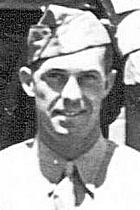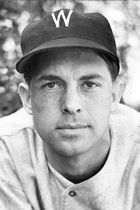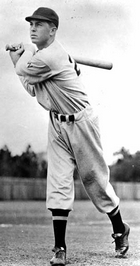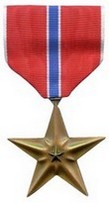Cecil Travis
Ballplayers Decorated in Combat
| Date and Place of Birth: | August 8, 1913 Riverdale, GA |
| Date and Place of Death: | December 16, 2006 Riverdale, GA |
| Baseball Experience: | Major League |
| Position: | Third Base/Shortstop |
| Rank: | Sergeant |
| Military Unit: | 76th Infantry Division US Army |
| Area Served: | European Theater of Operations |
Cecil H. Travis was born on a farm in Riverdale, Georgia, on August 8,
1913. His professional baseball career began in 1931 at the age of just
17, when he hit .429 with the Chattanooga Lookouts of the Class A
Southern Association. He batted .356 with the same team the following
year and was called up by the Washington Senators in May 1933, getting
five hits in his first game.
Despite his young age, Travis quickly established himself as one of the
outstanding players of the American League. Had he not been playing for
the perennial second-division Senators, he would have been hailed a
superstar. Playing shortstop and third base, Travis had compiled a
lifetime batting average of .322 by 1940, and his 1941 season – his
ninth in the major leagues – was by far his best. Playing in all 152
games for the Senators, Travis batted an outstanding .359 (second only
to Ted Williams’ incredible .406). He led the league with 218 hits and
finished second with 19 triples. He also had a career-high 101 RBIs.
But as quickly as Travis reached the top of his game his career was put
on hold. He entered military service on January 9, 1942, and would be
away from baseball for four seasons. At the time, Travis thought he
might be in the service for a year or so, “but you didn’t think you were
going to be there so long,” he later said.
Travis was assigned to Camp Wheeler, Georgia, as a private in the
special services branch. When he reported to camp his greeting from
Colonel Charles P. Sutherland was: "Well, son, you've finally caught up
with a world championship outfit."
Travis played and managed the Camp Wheeler Spokes baseball team and led
the team in hitting with a .472 average after ten games in 1942. The
Spokes went on to win the Georgia State semi-pro tournament in 1943, and
finished the year with seven straight wins to capture the National
Semi-Pro Baseball Championships at Wichita, Kansas.
In May 1944, Sergeant Travis was assigned to the 76th Infantry
Division’s combat training facility at Camp McCoy, Wisconsin, where he
played baseball with the 76th Infantry Division team. Teammates includes
major leaguers Bama Rowell and Bill Evans. The 76th Infantry Division
captured the Wisconsin State semi-pro championship in 1944.
The 76th Infantry Division was sent to Europe in late 1944, and entered
combat on January 19, 1945, during the final stage of the Battle of the
Bulge. Travis suffered a bad case of frostbite during that time, that
necessitated an operation. "Heck, you was in that snow," he recalled
some years later, "and you was out in that weather, and you was lucky
you got to stay in an old barn at night. The thing about it, you'd sit
there in those boots, and you might not get 'em off for days at a time.
And cold! You'd just shake at night. Your feet would start swelling, and
that's how you'd find out there was something really wrong - you'd pull
your boots off, and your feet is swelling."
The 76th Infantry Division advanced more than 400 miles against hostile
resistance in 110 days of combat. It captured more than 33,000 prisoners
and teamed up with the 6th Armored Division to form the spearhead of the
Third Army’s plunge across Germany toward Czechoslovakia. The division
was within 50 miles of the Czech border when the war in Europe ended.
Travis received a Bronze Star and four battle stars during his time in
Europe. He briefly played baseball with the Division team but took an
option to serve in the Pacific in return for leave to visit his wife and
newborn baby in Georgia. While at home, Japan surrendered and Travis
applied for his discharge. Working out with the Atlanta Crackers at
Ponce de Leon Park, while stationed at Camp McPherson, Georgia, Travis
had accumulated 97 discharge points and was honorably discharged on
September 6, 1945.
He immediately returned to the Senators. "It was amazing the way Cece
swung in his drill at Griffith Stadium yesterday,” reported John B.
Keller in the Washington Evening Star on September 8, 1945. “His easy
left-hand stance at the plate was no different from that he assumed when
he was one of the sensations of the American League in offense."
But the truth was the 31-year-old was seriously out of condition. He was
slow afoot, his bat speed was sluggish and his feet still hurt. Travis
played his first major league game in four years on September 8, 1945,
against the Browns. He played 15 games before the season ended and
batted just .241.
Everyone, including Travis himself, hoped the off-season rest and spring
training would bring back the magic. In 1946, Manager Ossie Bluege
played him a lot of the time at third base where less range was
required, and there were days when he looked like the pre-war all-star
he had been. But those days were few and far between. Travis batted just
.252 in 1946, and struggled to keep his average above .200 in 1947. For
the first time in his career, he found himself sitting on the bench.
One month before the end of the season he was honored with "Cecil Travis
Night" at Griffith Stadium, with General Dwight D. Eisenhower in
attendance. Why honor a player who was little more than a bench warmer
at that stage? Because Cecil Travis was one of the nicest, most
honorable gentlemen to ever play the game of baseball. When major league
umpire Bill McGowan was chatting with a group of soldiers after a USO
show during the war, somebody asked, “Who would you say was the player
who had given you the least trouble in a major league game, the one you
think most admirable in his conduct on the field and at bat?”
“Cecil Travis,” McGowan replied without hesitation.
Travis left the game as graciously as he had come into it. "My problem
was my timing. I could never seem to get it back the way it was after
laying out so long. I saw I wasn't helping the ball club, so I just gave
it up."
Travis declined an offer to manage in the minors and returned instead to
his family cattle farm in Georgia. “I would like to have done better
when I came back,” he said, “but I feel lucky to have come back at all.
Travis did remain involved in baseball as a part-time scout for the
Senators' until 1956. He then turned his full attention to cattle
farming for the next 50 years
Cecil Travis, of whom Ted Williams once said “is one of the five best
left-handed hitters I ever saw,” passed away at his home in Riverdale,
Georgia, on December 16, 2006. He was 93 years old and is buried at
Crest Lawn Memorial Park in Atlanta.
Travis was inducted into the Georgia Sports Hall of Fame in 1975, and
added to the Hall of Stars at Washington’s RFK Stadium in 1993. Despite
his .314 career average being better than 19 of 21 Hall of Fame
shortstops, Travis has, thus far, been overlooked by Cooperstown.
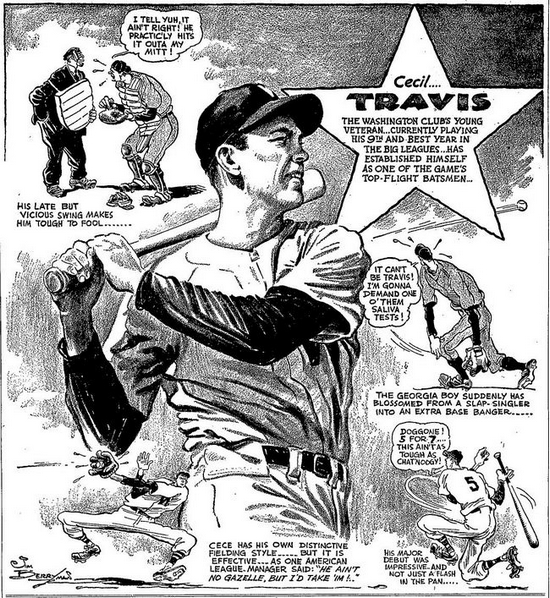
Date Added January 26, 2018
Can you add more information to this biography and help make it the best online resource for this player? Contact us by email
Read Baseball's Greatest Sacrifice Through The Years - an online year-by-year account of military related deaths of ballplayers
Baseball's Greatest Sacrifice is associated with Baseball Almanac
Baseball's Greatest Sacrifice is proud to be sponsored by

